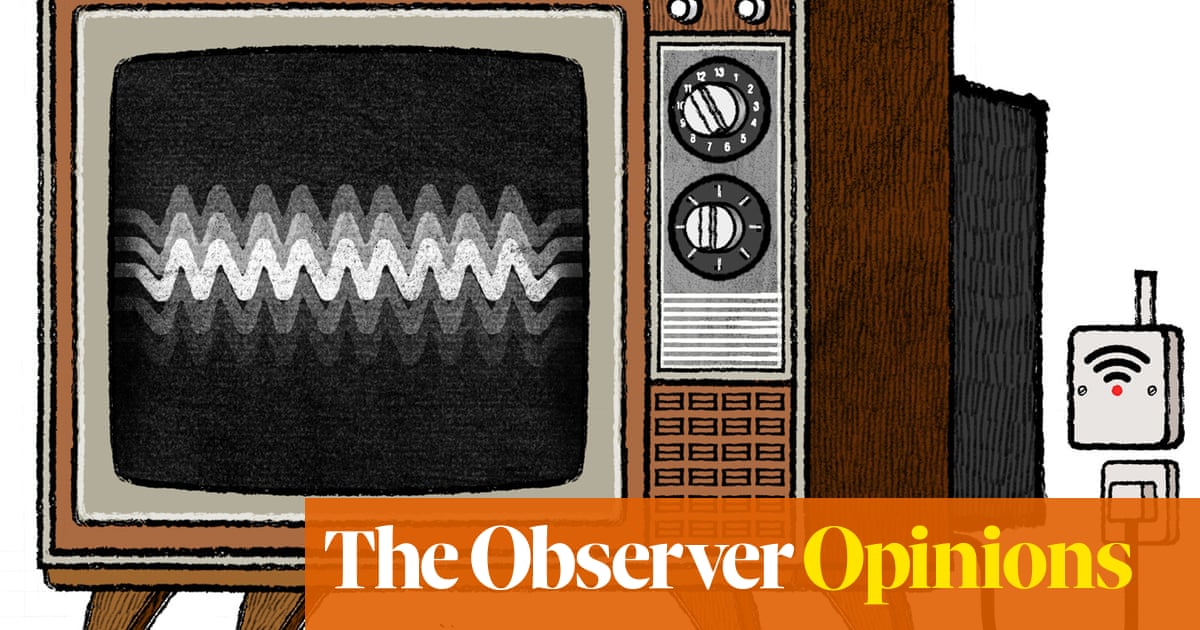
The mystery of the disappearing Welsh broadband has been solved. I don’t know what you’d expect the broadband signal to be like in the isolated village of Aberhosan in Powys. Personally, I’d expect it to be terrible. And it really was terrible. But it seems the villagers didn’t expect that. To them, this was a mystery.
My low expectations of data flow to rural areas will doubtless offend some. I apologise: it may be outdated but I mean it nicely. It’s not a slur on the countryside. Not being able to access the internet is a plus as far as I’m concerned. I look back fondly on the afternoon in 2009 on the Isle of Skye that I spent waving a Samsung flip phone around my head in the hope of it coinciding with a big enough blob of reception to get a text to send. I was significantly more likely to catch a flying splat of seagull shit. But the inconvenience makes you feel remote and, for me, that was the point of going there. Nowadays, I could probably get streaming HD. Which sounds like a disease. And maybe it is.
Anyway, the broadband in Aberhosan had been unexpectedly poor for some time and replacing cables had failed to fix the problem. Stranger still, the signal seemed to collapse at exactly 7am every morning. This prompted an investigation by the engineers responsible, who tramped round the village waving little detecting machines as if they’d just beamed down from the USS Enterprise. These machines, called spectrum analysers, discovered a strange disturbance in the force, if you’ll pardon the franchise-reference promiscuity. According to Michael Jones, an engineer for Openreach, there was “a large burst of electrical interference in the village”.
What do you think was causing it? Pylons? An alien ship? Vigorous jogging while wearing artificial fibres? No, it was an old television set. Someone was turning on an ancient secondhand telly every morning at 7 o’clock and it was making the broadband go haywire by emitting a “single high-level impulse noise”, which is apparently also called a SHINE. Or, rather, the emission of it is a SHINE. The noise itself, as a pre-emitted concept, is presumably a SHIN. So the old TV stuck out a SHIN and tripped up the broadband.
There’s a no-nonsense Life on Mars quality to this. I’m imagining a big old brown telly, wood-effect round clunky buttons at the front and a dusty protruding slotted plastic rear, plastered with dire warnings of the life-threatening electrics that lie within. A huge great buzzing cathode-ray tube that takes five minutes to warm up and generates enough static to hoover all the dead skin cells out of a surrounding arc of carpet. The sort of machine that wipes cassettes if you leave them near it and reduces transistor radios to white noise. The super-fast broadband didn’t stand a chance. It was like a ballet dancer being rugby-tackled by a darts player.
But the older technology wasn’t allowed its triumph for long. The TV’s owners were reportedly “mortified” when the machine’s effect on local broadband was revealed and have agreed never to switch it on again. It’s so unfair! It’s not the old telly’s fault – it was just doing its buzzy thing, still fully functioning after all these years, and the new technology was too feeble to cope. But it gets turned off in shame, its owners somehow embarrassed not to have long ago thrown away and replaced something that still works perfectly well.
I’m an instinctive opponent of technological change. If my current hero, the old telly, had been interfering with a delightful Bakelite wireless a few decades ago, I would still have been rooting for the older technology. Had I been born in the stone age, I’d have been wistful about the days of just bashing things with a random rock in preference to using the new-fangled axe.
It’s all very well, you may say, for me to be contemptuous about technological wizardry, while I tap away on my biscuit-thin laptop, sipping an electric-kettle-heated liquid in a house with central heating (though, thanks to the global warming it contributed to, I don’t currently need to use it). I benefit from technology, take it for granted, then slag it off. I moan about social media as I fill the dishwasher; I fret about smartphone addiction while waiting for the microwave to ping; I say horrible things about Amazon and Google while enjoying a long life expectancy, unprecedented ease of taxi ordering and those amazing wheels that suitcases have nowadays. What a hypocrite!
Personally, I think the moaning is important. Technological advance is inexorable and lucrative, which obviates the need to be encouraging about it. But the need to point out where it spoils things remains, even, I would argue, when there’s nothing really to be done. We don’t have to pretend to like things just because they’re inevitable – for our sanity, it’s important to draw a distinction between what we can’t change and what we don’t want to.
So when I hear, for example, that the new Apple watch, as well as taking electrocardiogram-style heart measurements (which the previous version also did), can measure your blood oxygen levels and therefore presumably convey them to everyone from the NHS to GCHQ via Vladimir Putin, I feel liberated to wish it didn’t exist. I don’t deny it’s very clever, but I don’t want one and I also don’t want, in a few years, to have become the only weirdo who won’t get one. “What makes you so secretive about your blood oxygen levels?” is not a question I feel I should have to answer.
It’s not the Apple watch but the ancient TV of Aberhosan that needs protecting. I love television and have spent my career working in that industry. The internet has looked set to ruin it ever since I started and, like everyone who works in one of the many sectors of society that are managing an irreversible decline, I’ve tried to come to terms with that. But the expectation that someone must literally turn off their television forever in order to make the broadband work is a little bit too symbolic to bear.











